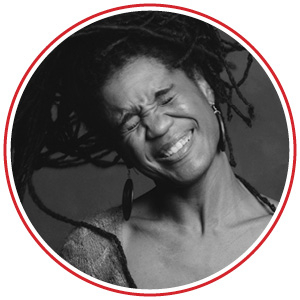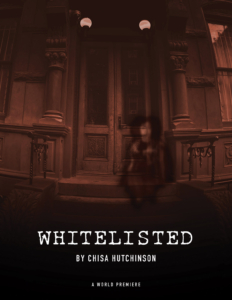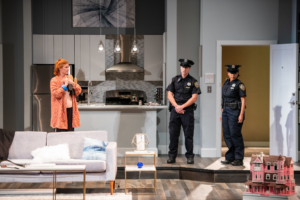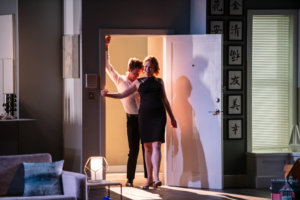PLAYWRIGHT INTERVIEWS
Interviews conducted and edited by Colin McGuire.
At this poing, Chisa Hutchinson is a grizzled veteran of the Contemporary American Theater Festival. Having had two of her plays produced at past festivals, she’s back this year with Whitelisted, a play the author happily refers to as a horror story that focuses on racism, white privilege, and the supernatural. Knowing that the story might be polarizing to any audience that consumes it, Hutchinson was quick to point out that she isn’t afraid to spark difficult conversations through her work as a playwright. “If I just reach one person per performance,” she explained in a recent interview, “that’s good. If I just have one person going home a little different or moving through the world a little differently than they did before they saw it, I’ll consider that mission accomplished.” That in mind, the following is the text of the full conversation between CATF and Hutchinson:
This is your third time at CATF, is that correct?
Yeah! It’s such a cool thing to feel like you have a home, an artistic home.
Do you feel like this is one of those places you’re going to come back to a lot, say, from now until the end of time?
I hope so, man. It’s just so cool and it attracts the coolest people and I always have a really great time here. I’ve been in town since the start of rehearsals, which was early June.
This being the third time, is there anything that makes this different? Are you settled in now?
I feel pretty settled. It’s a little weird to walk around and people are like, “You’re that playwright!” It’s very different from New York, where you can’t swing a dead cat without hitting a playwright and nobody cares. I feel like I know people here and it just always feels so welcome. I know where to go and I have opinions when things change. I haven’t been back for a while and some businesses are gone, so that’s a little sad, but it’s been cool getting to know the new places and eating at the new restaurants.
Bringing a new play this year, does that give everything a different shade of color each time you come? What are some of the differences between your first year and this year?
Oh, yeah. The first year, I had absolutely no idea what I was in for. I didn’t know what the production values were going to be. The casting process was a complete mystery because I wasn’t really involved with that. Now, I feel like I’ve sort of been invited into that part of things. I try to come back with something very different every time because I don’t want to bore people. The first year was a sort of intimate play about deeply philosophical things and the second year was a spectacle with a cast of dozens. This one is kind of a hybrid. It’s intimate, but there’s definitely spectacle involved because it’s a horror play.
Yeah, let’s get into the play. There’s a line in the blurb about the play that said something like there’s some supernatural shit that starts happening and things go haywire. Is supernatural shit something you’ve done before?
Actually, yes. One of the very first plays I wrote a long time ago. It’s never had a production, so that should let you know how successful that was [laughs]. I tried it before, but it wasn’t quite right, but this play is definitely more firmly grounded in the horror of it all. It’s hard to talk about it without spoiling it. All the special jump-scares you expect when you go see horror movies, I tried to embed them into this play. It’ll be really fun to see how it goes. We’ve done some of the technical stuff, but we haven’t run it all the way through with all the special effects. So, I’m still anticipating, still very eager to see them.
When you sat down to write the play, did you always know it would be a horror play or after you got into it, did it just so happen that supernatural elements came into play?
Oh, no, I definitely had in mind that I wanted to do a horror play. I was very inspired by Jordan Peele. “Get Out” had just come out and I was like, “Oh my God, that would be so cool if I could do that, but on a stage and in 3-D!” I’d like to think this is if Jordan Peele wrote a play.
Can you talk a little about what the story was to begin with and how this came about in your mind? What made you say, “I need to write about this?”
I think there’s something about the experiences of Black Americans that just lends itself to the horror genre. I had been paying attention to the news, like a dummy. There was a rash and people really started to take notice of what a problem this is when Amy Cooper was walking her dog through Central Park. She didn’t have her dog on a leash, even though she was supposed to — there are signs everywhere saying you’re supposed to. There was a gentleman, a Black gentleman, who pointed this out and said, “Hey, you really need to leash your dog,” and she got really offended by this. They got into a back and forth about it and he began recording on his phone because she was threatening to call the police on him.
It was just such a bizarre thing to see it in real time, someone owning that privilege, that entitlement, just knowing the police would be on her side. She was like, “I’m going to call the police on you, even though you’re not doing anything, even though you’re reminding me to do something legal.” I actually had this happen to me. Our next-door neighbors are quite antagonistic. A lot of it is on the lines of race. They regularly call us the N-word from their open windows. They get into arguments a lot. We generally don’t call the police unless we hear someone say, “I’m going to kill you,” or if it sounds like someone’s being harmed. One night, some other neighbor called the police, but she somehow got it in her head that we called the police on her, so she came charging over to our door. She was banging on our door. She did this twice, and of course we weren’t going to open the door with this angry, crazy, racist lady on the other side. So, she called the police on us and told them we were harassing her. We had her on camera because we have a Ring doorbell.
She was clearly in the wrong for what she had done, but when the police showed up, I had to watch my Black husband try to explain to the police officers what the deal was. He calmly had to do this while she sort of watched gleefully from her porch. It’s that kind of experience that’s like, OK, we were very lucky that we didn’t have a trigger-happy cop show up. That’s not the case for everyone to whom these things happen. You never know. It’s kind of like a racial minefield in the fact that there are people out there who are weaponizing their whiteness in this way. It’s scary. It’s horrific. So, yeah, of course. Horror play. That’s what inspired this tale.
You never shy away from confronting race issues in your work. When it comes to this play specifically, how does it rank for you internally? Is this one that you’re more proud of than some of the others you’ve done? Or can you even say at this point? Do you even know yet?
Yeah, I don’t know. I think I have to see how an audience receives it first. Because that, for me, is the measure of, “Am I doing my job? Is it working?” Yes, it’s cathartic to me to sit and write these things out and have actors come and read them and talk about the play in a really intelligent way. That’s all fine and good and I very much appreciate that part of the creative process. But the measure of a success of a play, to me, is how the audience receives it, if it lands, how it lands. Because that’s the point of playwriting — to connect with other people through this vehicle that is the play.
Is there a part of you that might like to see people a little uncomfortable, or at least think of things they might not have thought of otherwise? Is that something you aim for?
Yeah, it is. Particularly with this play … there was an experiment in empathy. Scientists took people who had demonstrable biases against particular populations and they would sit them down in front of a monitor and on the monitor would be a person from the particular population they were biased against. There would be experimenters on both sides who would do things like tickle their face with a feather or brush their hair or something like that. They would try to mirror whatever physical thing was being done and they would find that just this activity would reduce bias. I thought it was really interesting. It was a very direct way to forge some type of empathetic bond between unlikely people and I want to do that with theater. If I have to sort of gently indict my audience to achieve that, then so be it. It’s a safe space for feeling guilty. Nobody’s going to judge you, right? Because we all laughed at that inappropriate joke you made. You weren’t alone. You’re fine.
You used the phrase “gently indict the crowd.” Does that backfire sometimes? Are there moments when maybe they don’t take it so gently?
So far, not really, because I’m really not … I hope I’m not beating anybody over the head with this. I’m not pointing my finger or shaking my fist at anyone in particular. It’s just, “Here is a character I’ve observed out in the world and if you happen to share any of those characteristics, maybe think about that quietly on the way home.” I like to think I create a private space for an audience member to think about where they fall on the spectrum. And if they’re not liking that feeling of “I think I am kind of guilty of that and I didn’t realize the implications of that until now,” then sort of think about modifying that behavior [laughs].
Everybody is so polarized anymore and it’s almost impossible to have nuanced conversation either internally or externally. Do you see playwrights or artists as a whole shy away from this approach more and more because of that?
No, I see us all fumbling. It’s like, someone handed us a toothpick and said, “All right, chip away at this mountain of social ills.” We’re just sort of doing the best we can. Some of our tools may be a little more rudimentary than others. We’re all doing our best, coming at things from different angles. Some approaches work better for some audiences and others don’t. I don’t think this play is for everyone. I’m sure there are going to be people who do think it’s “beat you over the head.” Then, there will be people who interpret it in a completely different way. I’ve had that happen, like, “Oh, that’s the complete opposite of what I meant.” But I can’t help if an audience comes at it with a particular set of experiences or a particular agenda. So, if I just reach one person per performance, that’s good. If I just have one person going home a little different or moving through the world a little differently than they did before they saw it, I’ll consider that mission accomplished.
So, what happens next? This is the world premiere, right?
It is! This is my third world premiere here. I feel like this is such a great place to just, like, try shit out because the audience here is really thoughtful. They’re not afraid to engage with you in the coffee shop or the restaurant. They’ll see you and be like, “Hey, I had a question about your play!” They’re very adventurous, they’re smart and they’re open — open to whatever you want to serve up. They may not come back if they don’t like it, but I don’t know. So far, so good. I haven’t had anyone be like, “Well, that was just awful and you shouldn’t even be a playwright.”
Do you have anything in the pipeline or something in your head about what you want to tackle next? Or is that too far down the road?
My next project is actually a one-man show for Ras Baraka, who’s also currently the mayor of my hometown, Newark, New Jersey. He just released a book, a memoir, and I was contacted by the New Jersey Performing Arts Center because they wanted to commission a playwright who knows about Ras and who knows about Newark. They want me to write a one-man show for him based on his memoirs.
That sounds like it could be a lot of fun.
Yeah, I think it’s going to be a lot of fun. I started it and I am daunted because man, has he led a life. He’s led a serious life. And also, one-man shows are tricky for me. I don’t like direct-address. A lot of one-man shows feel like stand-up comedy routines without the comedy. I don’t want that, so what I try to do is really drop the character or person into a dramatic situation in which it makes sense that whomever it is they are talking to does not speak back.
Are there any other plans for Whitelisted? Is it going to go anywhere else?
Yeah, I’m knocking on wood as I say this, but I think it’s going to be done in New York in the fall of next year. I’m pretty sure that’s going to happen, but like I said, I’m knocking on wood.




